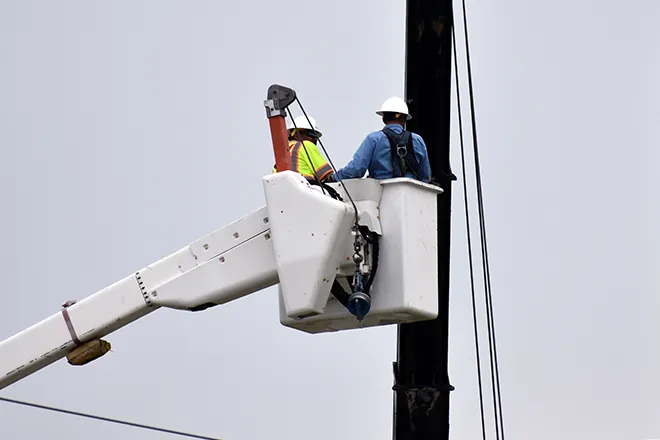
Daily Audio Newscast - June 17, 2025
© AlexLMX - iStock-823000260
Six minutes of news from around the nation.
American Bar Association sues Trump administration over executive orders targeting law firms; Florida universities face budget scrutiny as part of 'anti-woke' push; After Hortman assassination, MN civic trainers dig deeper for bipartisanship.
Transcript
The Public News Service Daily Newscast, June 17, 2025.
I'm Mike Clifford.
The American Bar Association is suing the White House to stop President Donald Trump's use of executive orders to punish and pressure law firms.
That from Politico.
In its Monday lawsuit, the ABA wrote, "Since taking office earlier this year, President Trump has used the vast powers of the executive branch to coerce lawyers and law firms to abandon clients, causes, and policy positions that the president does not like."
And as Florida implements sweeping changes to higher education, students at Florida Atlantic University voice competing concerns about budget cuts and academic freedom.
Governor Ron DeSantis' administration has ordered financial audits of all state universities while implementing the Stop WOKE Act, which removes certain social science courses from core requirements.
At FAU, students have mixed reactions.
Sociology student Meadow Swantek voices alarm about the state's educational policies, particularly what she sees as an erasure of Black history and also not having the right resources on campus.
Florida has implemented its own DOJ program, requiring public universities to appoint liaisons to handle requests for course materials, including syllabi, descriptions, and research published by staff.
The state hasn't clarified whether the program aims to scrutinize higher education.
A spokesperson said the audits would ensure responsible stewardship of taxpayer dollars.
I'm Tramiel Gomes.
This story based on original reporting by John Marcus for The Hechinger Report.
We head next to Connecticut, where consumers are reporting a new scam in the form of a tariff delay.
The ruse involves scammers saying a person's online order is delayed at the port unless they pay a tariff or customs fee.
It may also include a fake tracking number or show a delivery being sent to the wrong location.
Another red flag is unhelpful or scripted customer service with continuous blame on tariffs or U.S. customs agents for the delays.
Kristen Johnson with the Better Business Bureau serving Connecticut says the scam is coming up because of the prevalence of these terms in the news.
So it's more believable because we're learning about the tariffs just now.
We're seeing it more prevalent in news stories.
And so it sounds like it could be a possibility, but that's why we want people to take a step back and realize, no, the tariffs are not going to affect you on the back end after you've placed the order.
At least they shouldn't.
The scam has roots in social media ads, which could take someone to a fake version of a real website.
Johnson says people can bookmark the online shopping sites they use most often and their respective customer service pages.
She notes people should avoid shopping on a social media platform site because it can be harder to tell whether they're dealing with a legitimate company.
I'm Edwin J. Vieira.
To prevent scammers from gaining access to a bank account, consumer advocates suggest always paying by credit card.
Other forms of payment, like peer-to-peer apps, can help scammers get at personal data and information.
This is Public News Service.
The weekend assassination of Minnesota lawmaker Melissa Hortman is seen by many as a setback in recruiting future civic leaders who seek out bipartisanship.
One organization doing this work says it is still possible.
Hortman was often credited for being a fierce advocate for causes aligned with their supporters, but also for striking compromises serving as House Speaker in the state legislature.
Jake Loesch with Minnesota Citizens League says training people how to work with elected officials from the other side is a key part of their programming.
He says it might be hard for the public to see, but there are moments where good-faith bargaining wins the day.
There are always good bipartisan things that come out of any legislative session here in Minnesota.
But yeah, I think, unfortunately, that work doesn't always attract the news headlines.
Loesch's organization has a new program prompting state lawmakers to visit legislators from another party in their home community.
He says that makes it easier for them to see each other as humans, not the enemy.
I'm Mike Moen.
And the mayor of a rural Utah town says the clean energy investments and tax credits created by the Inflation Reduction Act are helping drive economic growth and diversity for her town's energy portfolio.
Mayor of Helper, Utah, Laniece Peterman, claims tax credits have been vital for communities like hers as they help modernize their systems.
But the budget reconciliation package now in Congress would eliminate major parts of IRA funding, including clean energy investments.
Peterman says that could be detrimental to locals who've been able to harness the power of tax credits to grow their businesses.
The jobs are there.
We just need to ensure that we have the educational resources available, especially to people who may be transitioning out of a traditional coal plant or coal mining to be able to step into those roles.
But the roles are there.
She adds while federal dollars in rural communities affect fewer people, their impact is triple that of urban communities.
I'm Alex Gonzalez reporting.
Finally, Ohio food banks are urging state lawmakers to approve what they say is a modest budget increase needed to get more fresh local produce into the hands of hungry families.
The request coincides with National Fruits and Vegetables Month and a broader call to support both food access and local farms.
Through the Ohio Agricultural Clearance Program, surplus produce from nearly 100 Ohio farms is delivered to food banks statewide.
Fruit Growers Marketing Association President Alex Buck says the funding request isn't just about food access.
It's also about sustaining local agriculture.
Our relationship with the food banks isn't for profitability purposes.
It is the right thing to do to support our communities.
It also allows our farms to be compensated fairly for produce that would not normally make it to the retailers.
Farah Siddiqui reporting.
This is Mike Clifford for Public News Service, member and listener supported.
Find our trust indicators at publicnewsservice.org.
















